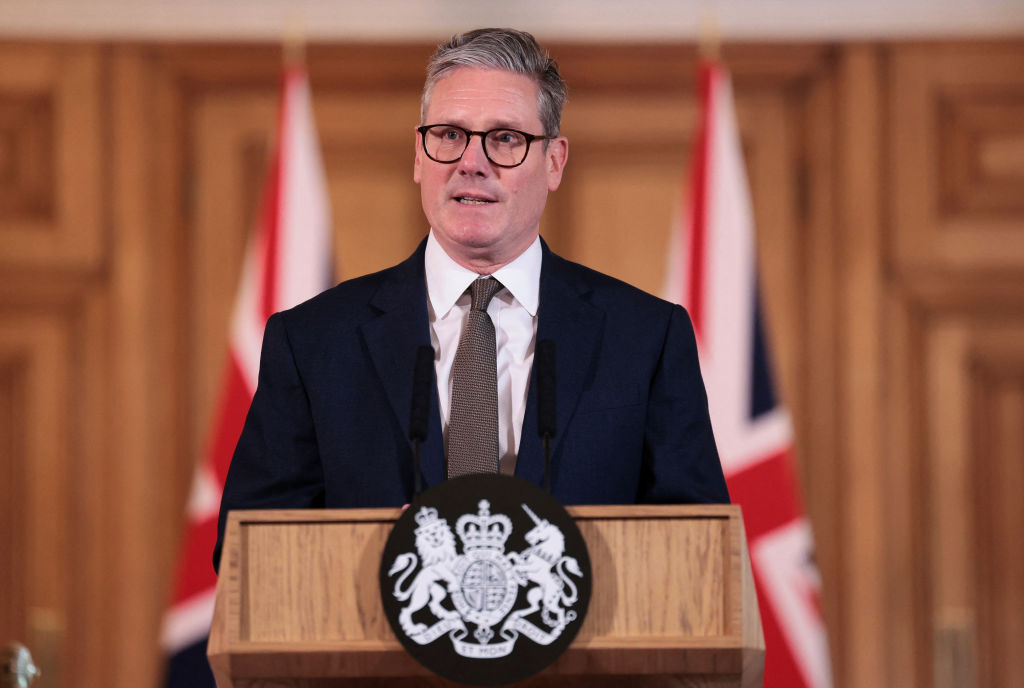The world appears to be turning on its axis — and moving hard to the right. The New World is tilting hardest. In Argentina, Javier Milei is taking a chainsaw to bureaucracy. In the US, Donald Trump is poised to deport migrants, deregulate the economy and drill, baby, drill. Canada’s tendresse for the maple-syrupy liberal Justin Trudeau chilled into a bitter determination to oust him in favor of the anti-“woke, “pro-growth “true conservative” Pierre Poilievre.
And where the New World has led, the Old is following. Giorgia Meloni is now Europe’s most consequential leader — upholder of some pretty traditional values with a strikingly hard policy on migration. Germany goes to the polls this month, with the next chancellor likely to be CDU’s Friedrich Merz, a man to the right of his party predecessor Angela Merkel. Challenging hard in second place is the far-right AfD, buoyed by Elon Musk’s endorsement, and potentially eclipsing current Chancellor Olaf Scholz’s SPD.
One country, however, seems to be the exception to this rule. The UK. While other democracies play their part in the Great Moving Right Show, Britain under Keir Starmer appears to be putting on a revival of the old classic Socialism in One Country.
But if we look beyond Westminster, study the currents of public opinion and pay close attention to the data, we can see that Britain is not moving to the left in line with its government. The British public is instead moving consistently right — on different issues at different paces, yes — but still, decisively, away from Labour.
Over the past year or so, British voters have shifted from giving 38 percent of their votes to the collective right to nearer 50 percent. This change has happened even as there has been a near-constant struggle for supremacy on the right between the Conservatives and Reform. While Westminster is fascinated by that particular battle, the conflict between the two parties does not appear to have slowed the wider public’s sharp shift rightward. It is this part of the story that deserves a little more attention.
The wider move among voters toward more conservative positions is driven by what political scientists call “thermostatic politics.” As government policy travels in one direction, the public tends to go the opposite way, thereby regulating the “political temperature.” But what is different this time is how quickly and decisively the country has flicked the switch to the right.
Most previous changes in public opinion have built up over time. When New Labour came to power, it was on the back of support for higher tax-and-spending, generated by a reaction against the John Major years. In the late 1990s, 60 percent of the public in the British Social Attitudes Survey (the gold-standard measure of satisfaction among citizens) backed a bigger state. Support for higher tax-and-spend, however, fell, gradually and then suddenly, during the Blair-Brown years to the point where it was just 30 percent by 2010. That political climate change led not just to a new government, under David Cameron, but support for the austerity it introduced. The Conservative-Liberal Democrat coalition’s willingness to cut spending was initially in tune with public opinion, but as those cuts bit deeper, so support for higher public spending slowly increased, peaking again at 60 percent during the height of Corbyn-mania in 2017.
Those changes, while profound, took time to develop. The recent shift to the right — in values and then voting intention — has been much sharper. It has its roots in changes in public opinion on questions such as migration, which were developing even before the general election last July. At its high point, Labour enjoyed a monthly polling average of 47 percent in January 2023. Its general election performance was much weaker. In the latest poll by our firm Focaldata, its support has fallen to 26 percent.
The level of public backing for the Starmer agenda is much shallower than the size of his majority might imply. Ipsos Mori pollster Keiran Pedley has written compellingly about Starmer’s surprisingly poor early satisfaction ratings, the lowest of any prime minister since the polling firm began its tracking. More recently, there have been a clutch of polls which have analyzed voting intentions seat-by-seat. They point toward Labour not just forfeiting its landslide majority but losing between 150 and 200 seats, including those of Angela Rayner and Ed Miliband. That is just months after coming into power.
Underlying this move away from a willingness to vote Labour is a significant decline in public trust in Starmer’s government to deliver on bread-and-butter issues. Two of the three most important issues for voters are health and living standards. In July 2023, Focaldata found that 45 percent of the public thought that Labour was the best party to handle the National Health Service. Today it’s just 31 percent. Similarly, in July of last year, 38 percent of the public thought that Labour was best placed to handle the rising cost of living; that figure has dropped to 24 percent.
The third issue which matters most to the British public is migration. And here Labour does even worse. Recent YouGov data from its monthly immigration tracker shows a staggering 70 percent of British people believe that immigration has been too high in the past ten years. It doesn’t get any better for Labour on other security issues. Labour is behind both the Conservatives and Reform as the party best placed to deal with crime and policing.
Labour’s support is getting shredded in every direction, but the Conservatives have not yet reaped the benefits. Rebuilding credibility on immigration and crime matters hugely for Conservative fortunes. It was a failure to deliver on these socially conservative concerns, according to several election postmortems, which played a key part in Reform’s resurgence and turned a loss into a near wipeout for the Tories.
Since the election, Reform has been advancing. The polling suggests it is Labour the party is hitting hardest. We recorded Nigel Farage’s party at 21 per- cent in our latest survey, just five points behind Labour. Red Wall voters are falling fastest. Political analyst Dylan Difford has pinpointed that among all the recent post- election polling, Labour’s fall in vote share from 34 percent last July to the mid-twenties today has been uneven across the country. The decline has been most acute in the Midlands and north of England. Labour has also done disproportionately badly with older voters. Among these groups, Difford observed double-digit falls in support for Labour.
These are precisely the more socially conservative and patriotic “hero” voters Labour’s election-winning strategist Morgan McSweeney shrewdly targeted to assemble Starmer’s majority. His approach was supremely efficient in maximizing seats per vote. That is why these are exactly the worst voters for Labour to lose. If the party’s poor performance among these voters persists, the damage to Labour in a future election may be even worse than the national polls or uniform national swing suggests. Labour’s developing vulnerability with socially conservative voters is clear. The battle between Reform and the Tories for these voters’ support will be critical to Labour’s fortunes.
But the most interesting question in British politics is where the right goes next on the economic debate. Much will depend on the choices Farage and Conservative leader Kemi Badenoch make.
Strong support for consistently higher government spending — particularly on the services voters use — has been a feature of the British Social Attitudes Survey over many years. What is, however, particularly worth watching is the direction of travel within that total. In our latest poll, support for reducing government spending altogether has grown since the election to 17 percent. This may not seem huge, but it is higher than the highest the British Social Attitudes Survey has ever recorded. The number of people favoring higher tax-and spend has also dropped to the lowest share in a decade (albeit still at 38 percent).
That is a clear shift. But our research over the past couple of years indicates how difficult it is to cleanly segment people’s economic views on a classic left-right spectrum. Commentators often assume that the public are all either coherent small- state tax-cutters or rigorously social-democratic statists. There does exist a small and still poorly defined group on the economic right who are — broadly — pro innovation, low tax, low spend, private-sector focused and skeptical of government debt and the size of the deficit. There is also a small and swirling group on the left which is broadly its opposite. But many more voters hold economic views which do not fit neatly into Friedmanite or Keynesian boxes.
Voters respond to different economic propositions issue by issue, often depend- ing entirely on how a question is framed. There is an electoral coalition that supports abolishing inheritance tax. But this is not the same as the group of voters who say they want a smaller state. The public consensus appears to be: tax cuts yes; spending cuts no.
Our research also shows that the people who disagree with the idea that “the size of the state is too big and should be reduced” — that is to say, those happy with high spending — are not the same group as those who want to tax the super-wealthy more. Again, there is still a sustained clustering around the principle that spending should be kept high and taxes low.
That is the challenge for those on the British right if they wish to harness all the emerging trends in public opinion to ensure a decisive breakthrough. On social issues, there is a clear path to solidify a growing conservative bloc. It will require a position that is tough on crime, tough on immigration, and clear about British identity.
But on the economy, there is — as yet — no such clarity. There is a developing appetite for a tougher approach, but it is still unclear where the boundaries lie. Britons remain attached, in a somewhat hazy way, to an economic consensus which is both incoherent and unworkable. The average British person is unsure about whether the size and role of the state is right, so is therefore happy with tax rises so long as they aren’t affected personally. Voters are keen for better public services — but usually just those they use themselves. The typical voter is certain about the need to control debt levels over time but rejects most of the measures to achieve this goal. Overall, British views on the economy tend toward socialism for me and slashed spending for everyone else.
This incoherence in public opinion flows from a lack of economic leadership from elites. Cakeism, anyone? And it has had consequences. Public spending as a share of GDP hovers around 45 percent, but levels of support for public spending restraint have not tracked spending realities. The economic thermostat is only just beginning to tack right in response to our ballooning spending levels and tax rates — but has plenty more room to move.
Britain, like many other western democracies, is heavily indebted, but electorates have not woken up to what this means. In September last year, the budget office produced a graph of projected government spending and revenue forecast to the 2070s which indicated huge fiscal difficulties in the years ahead.
It is here that the battle on the right becomes most intriguing. Reform and the Conservatives can both pitch for the socially conservative vote. But on economic issues, Reform has been moving left, not right. It has indicated support for renationalizing the water industry and taking a protectionist approach toward steel. These positions make electoral sense for the seats Farage wants to target, particularly the post-industrial areas of the Midlands and the north. But will they reflect the still-developing appetite across the whole country for a leaner state?
The bigger issue of how affordable our current trajectory is will, inevitably, loom larger if growth continues to be flat or anemic. Might Badenoch’s commitment to “tell the truth,” if applied to economic fundamentals, chime with an appetite for clarity in direction overall? It’s certainly hard to imagine any of the other political parties embracing that potential shift in public opinion. The question now is whether Britain can provide its own lead actor for the Great Moving Right Show.
This article was originally published in The Spectator’s February 2025 World edition.


























Leave a Reply